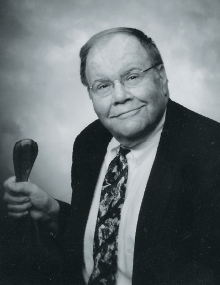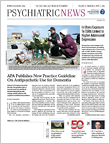“Any attempt to formulate a succinct, comprehensive overview of what happened in Washington last month at APA’s Annual Meeting is doomed,” began Psychiatric News’ June 2, 1971, coverage of what became one of APA’s most significant turning points.
The report was brief: “Only a single disruption occurred ... when members of the Gay Liberation and the Radical Caucus seized the microphone. ...” during an otherwise uneventful business meeting.
Among those who grabbed the mic was Franklin Kameny, Ph.D., an astronomer who had been fired from a federal government job after his homosexuality became known. Kameny took the occasion to attack APA and psychiatry in general for its “oppression of homosexuals.” At the time, homosexuality was defined as an illness in DSM, influenced both by psychoanalytic theory and general social prejudice.
This interruption was not well reported in the general press because at the same time some 7,500 anti-Vietnam War protesters were being arrested across town.
Kameny expanded his views on psychiatry’s position on homosexuality in a long letter to the editor of Psychiatric News published in the July 7, 1971, issue.
“Basically, we object to the negative attitudes of psychiatry toward homosexuality,” he wrote. “More specifically, we object to the sickness theory of homosexuality tenaciously held with utter disregard for the disastrous consequences of this theory to the homosexual, based as it is on poor science.”
A more dramatic challenge to the status quo came a year later when the 1972 APA Annual Meeting in Dallas hosted a panel with gay advocates titled “Psychiatry: Friend or Foe of Homosexuals—A Dialogue.” There, a man wearing a rubber Halloween mask and a bushy wig slipped into the room and was introduced as “H. Anonymous, M.D.”
“I am a homosexual,” he said. “I am a psychiatrist.”
“The masked psychiatrist spoke of his difficulties in keeping his sexual orientation secret because of the bias and rejection he would encounter,” reported Psychiatric News. “‘My greatest loss,’ he said, ‘is my honest humanity. How incredible that we homosexual psychiatrists cannot be honest in a profession that calls itself compassionate and helping.’”
Another panel member, APA Vice President (and later APA President) Judd Marmor, M.D., agreed with other speakers that psychiatry was biased against homosexuality.
“I must concede that psychiatry is prejudiced as has been charged,” he said. “Psychiatric mores reflect the predominant social mores of the culture.”
In a follow-up letter to the editor of Psychiatric News, Marmor argued by comparison that no one would suggest that strongly held religious convictions be considered to be mental illnesses.
“In a democratic society we recognize the rights of such individuals to have widely divergent religious preferences, as long as they do not attempt to force their beliefs on others who do not share them,” he wrote. “Our attitudes toward divergent sexual preferences, however, are quite different, obviously because moral values—couched in ‘medical’ and ‘scientific’ rationalizations—are involved.”
Even though APA removed homosexuality from its manual of psychiatric illnesses in 1973, “Dr. Anonymous” did not reveal himself until 22 years later. He was John Fryer, M.D. (1938-2003), who was forced to leave his psychiatry residency at the University of Pennsylvania when it was discovered that he was gay. He eventually became a professor of psychiatry at Temple University.
APA remembers the masked pioneer of gay rights in its annual John Fryer Award, which honors a person who has contributed to improving the mental health of sexual minorities. ■
For a contemporary discussion of homosexuality and its relation to psychiatry, see “A Symposium: Should Homosexuality Be in the APA Nomenclature?” from the November 1973 issue of the
American Journal of Psychiatry, can be accessed
here.



